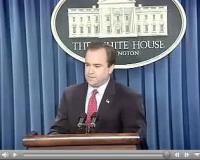Monday, November 28, 2005
Duke

The Republican battlements have finally been breached. While in power, the Republican party has understandably done all it could to protect the jobs and reputations of its members in the House and Senate. Even when Randy “Duke” Cunningham threw punches at another Member of Congress on the Floor of the House of Representatives, the shield provided to him by the Republican majority in both houses deflected much of the potential blowback. Finally, however, his corruption has caught up to him. Today Duke delivered a tearful confession and resignation.
At the end of the summer he affirmed his innocence, but declared he would not run for reelection for fear of besmirching the campaign or his party through the ‘wrongful’ allegations. Any way you slice this, it was a smart political move. He probably couldn’t win with such heavy accusations, but declaring his intent not to run for reelection allows Republican candidates for his seat the time they need to collect the necessary bank roll to stage a successful campaign. If he can't win, at least he can guarantee a Republican victory rather than allowing a Democrat to rise above the chaos and be elected while the GOP squabbles between one clean candidate and one incumbent.
Now that he has confesed to bribery, tax fraud, ethics rules violations, conspiracy and other crimes, Duke faces substantial jail time and heavy fines. It will certainly be a trying time personally as well as for his family. I hesitate, therefore, to discuss the political consequences of his shameful resignation, but I believe they at least deserve a quick nod.
From the time of resignation, the governor has 120 days by which time a special election must be held. This accelerated campaign schedule and short time frame favors the Democrats. Francine Busby, the Democratic candidate has been fundraising and strategizing since Cunningham won last November. Republicans have only had since Duke’s declaration in August. By hastily evacuating his seat, he has left it vulnerable to a partisan swing even in a staunchly conservative district, but we’ll see how this plays out.
Friday, November 25, 2005
Apathy - an American Achilles Heel

You know what really grinds my gears? Americans. Much of the time I am pretty proud of America. It’s not hard to point out the many things we do right, and by the same token, it’s not hard to point out the many things we do wrong. It is heartening, when you think about it, that our big governmental scandals revolve around exploiting tax loopholes or committing adultery (relatively tame crimes when compared to the world at large) rather than the mass murdering of citizens or the involvement of high-level government officials in well-known terrorist cells (as is the case in some less stable countries). What concerns me most about America, however, is apathy.
I saw the above cartoon late thanksgiving night, but I felt its truth during my thanksgiving dinner. In America politics are taboo. While in London, I’d walk into a hole-in-the-wall breakfast place and there would be old men sitting in Burberry caps and articulately debating the politics of the Westminster parliament as well as that of the EU and even the US Congress. Apparently the only thing more amusing than hearing this over breakfast, is hearing it over dinner when the old men are drunk and yet somehow still articulate and educated.
In America, the most common topic of conversation in a bar or restaurant is probably sports. At the thanksgiving table people talk about sports. If you want to bring up an interesting conversation of substance, such as one relating to politics, be prepared for the immediate volley of glares that will ambush you from every direction. Why are sports a more suitable topic of conversation? Why is anything a less suitable topic. We are so uptight here in America, and so obsessed with being Politically Correct (ironically enough), that we skirt complicated or charged topics of conversation when we are together with multiple viewpoints (via many family members) in favor of infinitely more vapid conversation.
The American electorate is grossly uninformed, and perhaps this is due to the fact that any attempt to disseminate political information is much like trying pushing water back into a gushing hose. If someone have an interesting political thought, or reads something in the newspaper that might affect our government, it rarely makes it past that person’s own consciousness since few Americans are willing to listen to or partake in a conversation of substance. Rather than debate and discuss the difficult issues of our time, we shove them in a drawer and hope someone else will sort them out. Even high profile debates like abortion rarely see debate. Battles are waged on the personal level – so-and-so wants to kill your babies, or so-and-so wants the government to tell you what you can and can’t do with your body. I can’t remember the last time I saw or heard a real substantive argument about whether or not the death penalty or abortion are right.
A large majority of people say they favor the death penalty when asked the question “Do you favor the death penalty for some crimes?” On the other hand, a majority of people often respond negatively to the question “Do you support the death penalty when life imprisonment without the possibility of parole is also an option?” Is America being contradictory or does this merely demonstrate that Americans are largely uninformed and that opinion can shift dramatically with the addition of one little bit of information? (Click here for polling information. Click here for any other information you might want concerning the death penalty and its efficacy. Current polling supports the conclusion that Americans support the death penalty. Though I think this is not always the case, I have included it in the spirit of education and accurate information dissemination)
Does anyone think that forming opinions out of ignorance is a positive thing? I hope not. But if it isn’t true, then what motivates us to be so active in our avoiding any kind of informal education on these issues. Why let propaganda drive public opinion when we as America can engage in discussion and education over our own dinner tables and work to drive public opinion based on real knowledge and understanding?
Do you have thoughts on this? I’d love to hear them. Post a comment.
Wednesday, November 23, 2005
King Me!

A British politics class that I sat in on while visiting the UK turned me on to an interesting dilemma involving third parties. This is purely an intellectual exercise and has nothing to do with the news of today. If interested keep reading. If not, skip to the next post.
In a two party system, such as in the US, voters have no real mechanism to hold a specific party accountable. If the Democrats are doing something liberals don’t like, liberals are SOL since their only recourse is to vote for someone else (negative reinforcement for the Dems and a negative - ie, moving away - reaction for the individual citizens trying to hold the Dems accountable). In most cases, even if a conservative doesn’t like the Republican representative running for her district, she is stuck since the Democratic candidate would likely be a much much worse fit for her views. Often this problem can be alleviated by a competitive third major party.
The main criticism attributed to the LibDems in the UK is that they don’t stand for anything unique from what Labour or the Torries stand for. The difference is - and it is important - that the LibDems hold many of the same views as Labour or Conservative, but in different combinations. If I'm an anti-war, pro-EU UK citizen, neither Labour nor the Torries represent my views well, but the LibDems do. In this specific case, the LibDems actually represent me better even though any single policy stance they hold could also be attributed to one of the other two major parties. This provides a positive outlet for voters. If I am Labour and Tony Blair starts to push legislation that I don’t like, rather than merely not voting or taking the nuclear option and voting for a party that just doesn't represent my views at all, I can vote for the similar party that has a different view on those few areas where my ideals break from those of the Labour party. As such, a competitive third party provides a mechanism for citizens to hold their parties accountable by allowing more subtle motions in public opinion to have a greater effect on the electorate. This stymies the tendency we see in the US for parties to polarize and run towards the more extreme ends of the political spectrum. Even now, with only a marginally competitive third party, the UK parties are converging towards the median voter and the center of the political spectrum rather than the political extremes as in the US.
But there is a unique problem. If there are three parties, often times there will be no clear majority party, but only a plurality party. This will foster coalition governments between the plurality party and the more minor third party (or the party closest in ideology). When this happens, the median voters become the king makers.
Oops. ok.... I am writing this from the airport and its time for me to go check into my flight. I’ll finish this off later, but for now... ponder the meanings of what I have said. Think you know what I am going to say? Think you can point out interesting subtleties? Post a comment.
Saturday, November 19, 2005
Eurotrip

Greetings from abroad. As I cavort about Europe this week, it occurs to me that the Feld-Blog hasn't been updated in a few days and so I am writing a short post from London. Here is a political rant Brit-style.
Last week Prime Minister, Mr. Tony Blair's Anti-terrorist bill was defeated in the House of Commons. This is especially astounding since Mr. Blair's own Labour Party already has a majority in Parliament. If he can get almost all of his own party to vote for his bills they all pass. This is why England undergoes sweeping changes every time Parliament changes hands - since the party in power already has a majority, the PM is usually able to push any piece of legislation he or she wants through parliament with relatively little difficulty.
Recently, however, a bunch of Tony Blair's own party members defected (a very serious offense in England - much more so than in Congress) to defeat what was essentially the 'Patriot Act' for the UK. Brits were able to recognize the absurdly broad powers these kinds of acts afford investigators and the ensuing blanket infringements on basic English rights, this all in the wake of the recent London bombings. Members of Parliament were not so short-sighted as to follow their leader into a domestic nightmare, I can only hope that Members of Congress will soon follow suit. So far they don't seem to have that track record.
Tuesday, November 15, 2005
GOP Are Obstructionists Too

Hypocrites! The nice thing about Republicans’ clarity of message is that we know when they go back on their word. If this administration is good at one thing, it is an almost fanatical devotion to their talking points. I even admire them for that. If Democrats could whip their members into shape like that, they might actually control a branch of government or two. The result of this strict script adherence, however, is an irrevocable media saturation of just a few sound bytes. During the whole filibuster debacle every other phrase out of every Republicans mouth was “we want and up or down vote,” “its only fair to give **insert nominee’s name here** and up or down vote.”
After complete saturation of their message with this sentiment, however, high-profile Republicans had the audacity to publicly call for Harriet Miers’ withdrawal from nomination to the Supreme Court. They actively refused to give her an ‘up or down vote.’ They were just as obstructionist as the Democrats, they just didn’t use official channels and techniques. The Republicans threatened a nuclear option of eliminating the filibuster just because Democrats were leaning on it to block some of Bush’s more fanatical nominations. Now that they have been pretty transparently obstructionist themselves, it seems Republicans cannot attack Democrats for their use of the filibuster without being entirely hypocritical.
Republicans have relied on the filibuster in the past just as much as Democrats do now. It is a function of having a minority in the Senate. It is just one equalizer of power in an otherwise entirely majority biased house of government. If Republicans in power feel justified being obstructionist even though they can exert power in many other ways as well, how do they have the audacity to undercut Democrats’ obstructionist abilities – now the only real way Democratic Senators can exert any power.
Sunday, November 13, 2005
Factoring in O'Reilly

I just don’t understand the world of public opinion. During the Republican national convention Senator Zell Miller challenges Hardball’s Chris Matthews to a duel and feels no repercussions. Dick Cheney actively opposes an amendment to ban torture and his numbers don’t move. Yet, Howard Dean lets out a passionate yell in the midst of an emotional victory speech and public opinion detonates his campaign. Now Bill O’Reilly essentially condones an Al Qaeda attack on San Francisco and any public outcry is almost completely absent. Granted his comments were fairly indirect, but this does not excuse their inappropriateness. Here is what he said:
O'REILLY: “Hey, you know, if you want to ban military recruiting, fine, but I'm not going to give you another nickel of federal money. You know, if I'm the president of the United States, I walk right into Union Square, I set up my little presidential podium, and I say, ‘Listen, citizens of San Francisco, if you vote against military recruiting, you're not going to get another nickel in federal funds. Fine. You want to be your own country? Go right ahead.’
And if Al Qaeda comes in here and blows you up, we're not going to do anything about it. We're going to say, look, every other place in America is off limits to you, except San Francisco. You want to blow up the Coit Tower? Go ahead.”
Let me just say, Thank God he isn’t the President. Maybe he’s exaggerating (I certainly hope so) but to condone terrorist violence on a city just for keeping military recruiters out of schools – a subject that has actually received some serious discussion in congress from both sides of the aisle – is one of the most incendiary and ridiculous comments I have heard in recent history and underscores some of the most unbalanced priorities I have ever heard escape the mouths of any pundit or politician.
How can America and the American Media allow Dean’s scream to destroy his campaigns while simultaneously allowing comments like O’Reilly’s to slip unnoticed under the radar. The media devours politicians in feeding frenzies over such inconsequential slip-ups as Bush’s annoyed looks in the debates. How can they then let O’Reilly get away with this? The same person who accuses people of being un-American for not supporting the war on terror just condoned a terrorist attack on a major American City. WTF?!?!
Wednesday, November 09, 2005
Bush's 'Ministry of Truth'

There are moments in my life I wish I could go back and erase. I am sure it is the same for most people. Everyone makes mistakes. However, the Bush Administration seems to think it has the power and prerogative to merely delete or edit their own gaffs out of existence. The official White House transcript of one of Scott McClellan’s recent press briefings has been altered to read differently from what McClellan actually said.
Scott McClellan is the White House Press Secretary – essentially the President’s public voice for day to day goings on in the White House. He always has to be ‘on,’ especially in the press briefing room where reporters pepper McClellan with leading questions intended to make him slip up. Apparently he messed up recently, but rather than issuing a public correction, as is the custom, the administration quietly edited the transcript.
McClellan was asked “We know that Karl Rove, based on what he and his lawyer have said, did have a conversation about somebody who Patrick Fitzgerald said was a covert officer of the Central Intelligence Agency. We know that Scooter Libby also had conversations….”
McClellan then interjected to say “that’s accurate.” At least the Congressional Quarterly transcribed it this way. You can even listen to the clip yourself by clicking here. The White House transcribed it as “I don’t think that’s accurate.” A pretty different sentiment if you ask me. Yet despite the recording of the briefing in which McClellan clearly says “that’s accurate,” the White House insisted that CQ issue a correction and change their transcript. Even if McClellan meant to deny the claim, it is blatantly obvious he did not say the words “I don’t think that’s accurate.” Just see for yourself.
It’s deeply troubling that the Bush Administration can stand in the face of undeniable evidence to the contrary and still insist that CQ issue a retraction/correction. This isn’t, or at least shouldn’t be 1984. Bush is not Big Brother. This is something I admit rarely, but there are times when he is a good president. That his administration is willing to go to such ethically suspect lengths to preserve adherence to talking points is overwhelmingly frightening. Never before have I seen such fanatical devotion to talking points. Its as if White House officials don’t have a vocabulary except that which is handed to them on paper each morning. This administration is against banning torture (see my post “Wrong Side of the Tracks”) and now they are blatantly altering records of the past and insisting its accuracy. Very disheartening. An we thought we needed the patriot act to be scared.
The Surfer State Rocks

I love where I live. California voters do not always inspire me with greatest confidence. After all, we did elect Arnold in the first place. Still, yesterday California sent Arnold a resounding, unified message: “Stop the craziness.” Every single proposition on the ballot failed. Even the dueling prescription drug bills both failed. They jockeyed for support, they battled over airwaves each trying to get more support than its opposition bill and yet, in the end the voters gave both a booming thumbs down.
On a similar note for all you San Diegans out there, the special election also gave San Diego’s mayoral office to Jerry Sanders. Frye won the plurality of the last runoff between Francis, Sanders and Frye, but it seems that the large majority of Francis supporters moved to support Sanders. I am also pretty happy with this outcome. Though I’ll admit Frye’s ideology more closely aligns with mine, watching the debates and hearing Frye’s almost completely single-issue campaign was pretty disillusioning. Transparency is great, but there are other responsibilities that come with the Mayor’s office. Sanders has the experience and though I don’t always agree with him ideologically, I hope his experience can dig San Diego out of the hole its fallen into both financially and through the recent rash of corruption.
Back to the propositions. Why a special election in the first place? What was wrong with the California state legislature? Schwarzenegger called an elections whose cost will weigh most heavily on the individual counties throughout California under the auspices or ‘reform,’ and yet he got nothing done. It really was a multimillion-dollar ‘whoops.’ What was wrong with working through the state legislature? President Bush, after all, often pushes legislation through Congress. Why couldn’t Schwarzenegger do the same thing in California? Probably because the California state legislature represents the citizens of California and Arnold does not. Recently the legislature put a bill on Arnolds desk legalizing gay marriage, an enormous and vital step forward for America’s stumbling LGBT civil rights movement. Arnold vetoed it. This same legislature probably saw the ridiculousness of these most recent propositions and shot them out of the sky. Frustrated, Arnold tried to go around the legislature only to run into another brick wall.
It’s unfortunate this election had to flop and flush a colossal amount of money down the drain. Still, at least the voters have called Arnold on his BS. These numbers do not bode well for Arnold’s reelection prospects, but when combined with the gubernatorial elections in Virginia and New Jersey, Democrats prospects for 2006 and 2008 are looking better and better.
Tuesday, November 08, 2005
Pirates?!?!??!

What’s a pirate’s favorite weapon? RRRRRRRRRRR-P-Gs (rocket propelled grenade). Believe it or not, an American-made, Miami-based cruise ship was attacked by Somali pirates last weekend. I know this has nothing to do with politics, but it’s PIRATES!!
A group of pirates in inflatable speedboats attacked a giant cruise liner with machineguns and rocket launchers. I am sorry, I am just having an issue getting over this. It wouldn’t be so funny though, if anyone was killed. Luckily, only one crew member was injured and nobody died. Actually, the giant cruise liner kicked their engines into high gear and outran the pirates’ speedboats. The crew even used non-lethal sonic weapons to repel the pirates.
I was pretty sure the age of piracy was over, but maybe I am wrong. I am sure this is actually a problem for Somolia, a country that hasn’t had a central government for quite some time now. Still, I cant help but chuckle that a group of pirates attacked a ship in 2005. I am glad everyone is going to be ok and that very few people were hurt. Still, I just couldn’t pass up the opportunity to talk about pirates.
Kudos to the passengers and crew of the ship who fought off the pirates.
Friday, November 04, 2005
Let's Talk Ethics
Ethics are not intuitive. Many times actions are morally ambiguous. To say that something is unethical is not enough, you must substantiate that argument just as you would any other factual claim. Emmanuel Kant says the only necessary ethical truth is that you must treat people as ends in themselves, never use other people as means to your own end. Utilitarianism says as long as the consequences provide the most good for the most people, it’s fine to break a few eggs along the way. This treats the overall happiness of a society as the base judgment for ethics. Divine Command theory states that things are ethical or unethical because god says so.
Ok, now that you’ve had a crash course in college philosophy, let’s talk politics. Alito’s nomination has sparked debate in the Senate as to whether Senators can ethically consider Alito’s ideology in choosing how to vote on him or whether qualifications must hold all the weight. I suppose it depends on which ethical benchmarks you want to fall on. The Senate ethics rules don’t tell Senators how to make up their minds, so to look for ethics in this case we must go back to the ethical theories above.
Many people today frown on strict utilitarianism saying there are just some things you can’t do regardless of the consequences. There are just some cases in which the ends do not justify the means, no matter how beneficial. But let’s look at it this way: Do the means justify the ends? If Senators feel ethically obliged to let qualifications play the starring role in their voting decisions, the consequences could be dire. If we know Alito’s ideology and we think his presence on the Supreme Court will jeopardize the freedoms many of us have grown up taking as given, can you really justify saying “well I confirmed him because I thought ideology shouldn’t play a role in my vote?”
Permit me some hyperbole here. If Stalin or Castro or Hussein or Mussolini went to Harvard University and Yale Law school, clerked for the world court and aced his LSATs, I still wouldn’t be comfortable confirming him to any judicial seat. This would obviously not be for lack of qualifications in this hypothetical, but some other factors need to be taken into account. Granted Alito is a patriot and an upright citizen of the United States - I wouldn’t doubt that for a moment - but if you feel that he will do ill for this country inadvertently or otherwise, that needs to be taken into account regardless of media and republican rhetoric panning Democrats for concerning themselves too much with ideology.
Should ideology be taken into account? YES! You are confirming someone to the Supreme Court of the United States. We should know everything about this person, and if anything at all renders him unqualified or unsuitable to sit in one of the most powerful seats of American government, that should be taken into account.
Ok, now that you’ve had a crash course in college philosophy, let’s talk politics. Alito’s nomination has sparked debate in the Senate as to whether Senators can ethically consider Alito’s ideology in choosing how to vote on him or whether qualifications must hold all the weight. I suppose it depends on which ethical benchmarks you want to fall on. The Senate ethics rules don’t tell Senators how to make up their minds, so to look for ethics in this case we must go back to the ethical theories above.
Many people today frown on strict utilitarianism saying there are just some things you can’t do regardless of the consequences. There are just some cases in which the ends do not justify the means, no matter how beneficial. But let’s look at it this way: Do the means justify the ends? If Senators feel ethically obliged to let qualifications play the starring role in their voting decisions, the consequences could be dire. If we know Alito’s ideology and we think his presence on the Supreme Court will jeopardize the freedoms many of us have grown up taking as given, can you really justify saying “well I confirmed him because I thought ideology shouldn’t play a role in my vote?”
Permit me some hyperbole here. If Stalin or Castro or Hussein or Mussolini went to Harvard University and Yale Law school, clerked for the world court and aced his LSATs, I still wouldn’t be comfortable confirming him to any judicial seat. This would obviously not be for lack of qualifications in this hypothetical, but some other factors need to be taken into account. Granted Alito is a patriot and an upright citizen of the United States - I wouldn’t doubt that for a moment - but if you feel that he will do ill for this country inadvertently or otherwise, that needs to be taken into account regardless of media and republican rhetoric panning Democrats for concerning themselves too much with ideology.
Should ideology be taken into account? YES! You are confirming someone to the Supreme Court of the United States. We should know everything about this person, and if anything at all renders him unqualified or unsuitable to sit in one of the most powerful seats of American government, that should be taken into account.
Thursday, November 03, 2005
A Backhand from Bush

Contrary to popular belief, it seems, the Supreme Court does decide cases dealing with issues other than abortion. A nominee should have qualifications other than just partisan opinions. The media and members of congress have tried to pigeonhole both Miers and Roberts on their abortion opinions when little was known about them. For Judge Samuel Anthony Alito Jr., however, we actually do know his opinion on current abortion law. It’s in black and white in his 1992 dissenting opinion in Casey vs. Planned Parenthood. He wrote harshly against current abortion law, not in personal opinion or partisan politics as with Miers or Roberts, but actually as a judge presiding over these cases.
Here’s a little background information for those of you who aren’t up to speed on supreme court constitutional doctrine. In 1976, Justice Henry Blackmun wrote the majority opinion in the case of Roe vs. Wade. In trying to outline a compromise to both sides of the issue, he set up a trimester system that really only angered both sides. Most people think of current abortion law in these terms. They are wrong. In 1992 the Supreme Court heard another case called Casey vs. Planned Parenthood.. Although this case upheld the fundamental right to an abortion in certain cases (many cases), it fundamentally changed the structure of Roe vs. Wade. It added new restrictions and dismantled the existing trimester system in favor a a much more convoluted set of critical points and criteria. The main point is that Casey vs. Planned Parenthood holds precedent at the Supreme Court bar today.
In order for a case to reach the Supreme Court it has to rise through the ranks of inferior courts. Guess who sat in judgment over this case before it reached the Supreme Court: Samuel Anthony Alito himself. He saw the exact same facts that the Supreme Court saw and ruled on exactly the same situation, but he ruled against preserving the right to abortion. Later that year the Supreme Court itself definitively struck down his opinion. He dissented as a justice for the 3rd circuit court of appeals, but put him on the bench instead of O’Connor and he might be in the majority.
While it is true that Alito has ruled in favor of pro-choice parties three times since 1992, they have largely been on technicalities and after he was forced to accept the Supreme Court decision as precedent.
I was right to worry about who Bush would appoint next if Miers failed. Miers may not have had the experience, but she was centrist at least. Alito will be a staunch right wing roadblock. We know this from his long list of opinions. We know this because he decided some of the same cases that rose to the Supreme Court. Conservative Judicial Activism, thy name is Samuel Anthony Alito. Filibuster!
Tuesday, November 01, 2005
A Quick Addendum - Iran

The President of Iran's remarks to an audience of approximately 4000 college students at a conference entitled "A world Without Zionism" are still entirely shocking and inappropriate. I would like to add a few notes however.
1. It is actually rather convenient that, as the President spoke, he stood at a podium with a banner hanging from it which read - written in English for our convenience - "A World Without Zionism." For a gathering of people whose common trait is hatred of the Jewish state and the American state, it is interesting that their banners were printed in English.
2. Also speaking at this conference were leaders of Hammas and Hesbola, terrorist organizations. He was in infamous company.
3. It is vital to note that President Ahmadinejad's comments did not end with Israel, nor did they end at rhetoric. President Ahmadinejad called for the destruction of Israel, but also the destruction of the United States. Furthermore, this is not a call to action for others, but rather, it was the President speaking his mind and articulating goals he beleives to be attainable on his watch. He stated bluntly, that he beleives the destruction of the US and Israel to be an attainable goal in the near future.
Whether or not you support or like Israel, these comments are ghastly reminders that the US is no more free from Iranian scorn than Israel. President Ahmadinejad's has recently attempted to convince the UN that recent Iranian purchaces of nuclear material are purely for energy and not weapons. In light of his comments, this is not a risk the US should take lightly. The President of Iran, a country rapidly aquiring nuclear technology, has pledged to attain the goal of destroying America. We need to stem Iranian attempts to develop nuclear weapons before it escalates to nuclear war.
I beleive that this is a more pressing matter than most people realize and until recently, it is not an issue with which I was familiar. These are facts that people must know.
